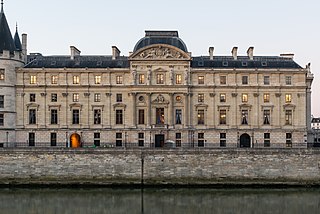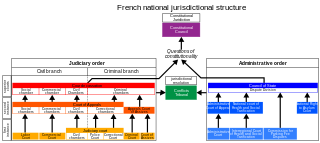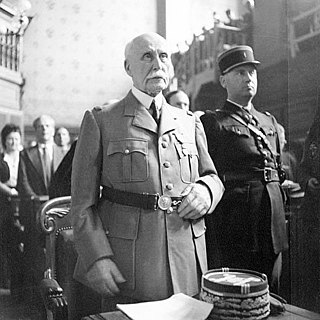Related Research Articles

The Napoleonic Code, officially the Civil Code of the French, is the French civil code established during the French Consulate in 1804 and still in force in France, although heavily and frequently amended since its inception. Although Napoleon himself was not directly involved in the drafting of the Code, as it was drafted by a commission of four eminent jurists, he chaired many of the commission's plenary sessions, and his support was crucial to its passage into law.

A court is any person or institution, often as a government institution, with the authority to adjudicate legal disputes between parties and carry out the administration of justice in civil, criminal, and administrative matters in accordance with the rule of law. In both common law and civil law legal systems, courts are the central means for dispute resolution, and it is generally understood that all people have an ability to bring their claims before a court. Similarly, the rights of those accused of a crime include the right to present a defense before a court.

Friedrich Carl von Savigny was a German jurist and historian.

The Court of Cassation is the supreme court for civil and criminal cases in France. It is one of the country's four apex courts, along with the Council of State, the Constitutional Council and the Jurisdictional Disputes Tribunal.

The Palais de Justice, is a judicial center and courthouse in Paris, located on the Île de la Cité. It contains the Court of Appeal of Paris, the busiest appellate court in France, and France's highest court for ordinary cases, the Court of Cassation. It formerly housed the Tribunal de grande instance de Paris which was relocated in 2018 to a new high-rise building in Paris's Batignolles neighborhood. The Palais de Justice occupies a large part of the medieval Palais de la Cité, the former royal palace of the kings of France, which also includes Sainte Chapelle, the royal chapel, and the Conciergerie, a notorious former prison, which operated from 1380 to 1914. It is located in close proximity to the Tribunal of Commerce, the Prefecture of Police of Paris, and the offices of the Paris Bar Association.
The 35-hour workweek is a labour reform policy adopted in France in February 2000, under Prime Minister Lionel Jospin's Plural Left government. Promoted by Minister of Labour Martine Aubry, it was adopted in two phases: the Aubry 1 law in June 1998 and the Aubry 2 law in January 2000. The previous legal working week was 39 hours, established by President François Mitterrand, also a member of the Socialist Party. The 35-hour working week had been on the Socialist Party's 1981 electoral program, titled 110 Propositions for France, but was not pursued because of the poor state of the economy.

Civil law is a legal system originating in Italy and France that has been adopted in large parts of the world. Modern civil law stems mainly from the Napoleonic Code of the early 19th century, and it is a continuation of ancient Roman law. Its core principles are codified into a referable system, which serves as the primary source of law.

France's independent court system enjoys special statutory protection from the executive branch. Procedures for the appointment, promotion, and removal of judges vary depending on whether it is for the ordinary or the administrative stream. Judicial appointments in the judicial stream must be approved by a special panel, the High Council of the Judiciary. Once appointed, career judges serve for life and cannot be removed without specific disciplinary proceedings conducted before the council with due process.

Martine Louise Marie Aubry is a French politician. She was the First Secretary of the French Socialist Party from November 2008 to April 2012, and has been the Mayor of Lille (Nord) since March 2001; she is also the first woman to hold this position. Her father, Jacques Delors, served as Minister of Finance under President François Mitterrand and was also President of the European Commission.

French law has a dual jurisdictional system comprising private law, also known as judicial law, and public law.
In France, a cour d'assises, or Court of Assizes or Assize Court, is a criminal trial court with original and appellate limited jurisdiction to hear cases involving defendants accused of felonies, meaning crimes as defined in French law. It is the only French court that uses a jury trial.

The épuration légale was the wave of official trials that followed the Liberation of France and the fall of the Vichy regime. The trials were largely conducted from 1944 to 1949, with subsequent legal action continuing for decades afterward.

Henri Capitant (1865–1937) was a French jurist.
Charles Jean Baptiste Florian Faider was a Belgian jurist and politician.
Georges Izard was a French politician, lawyer, journalist and essayist.
Philippe Couvreur is a jurist specializing in international law. He served as the Registrar of the International Court of Justice in The Hague from 2000 to 2019.

The judiciary of Belgium is similar to the French judiciary. Belgium evolved from a unitary to a federal state, but its judicial system has not been adapted to a federal system.

René David was a French Professor of Law. His work has been published in eight different languages. He was, in the second half of the 20th century, one of the key representatives in the field of comparative law.

The Courts of Guernsey are responsible for the administration of justice in the Bailiwick of Guernsey, one of the Channel Islands. They apply the law of the Island, which is a mixture of customary law dating back as far as the 10th century and legislation passed by the legislature, the States of Deliberation.

In France, a cour d’appel of the ordre judiciaire (judiciary) is a juridiction de droit commun du second degré, an appellate court of general jurisdiction. It reviews the judgments of a tribunal judiciaire. When one of the parties is not satisfied with the trial court’s judgment, the party can file an appeal. While decisions of a court of first instance are termed "jugements" in French, a court of appeals hands down an arrêt, which may either affirm or reverse the judgment of the court below. An arrêt (judgment) of the court of appeals may be further appealed en cassation. If the appeal is admissible at the cour de cassation, that court does not re-judge the facts of the matter a third time, but may investigate and verify whether the rules of law were properly applied by the lower courts.
References
- Motte, Olivier J. (2001). "Charles Aubry". In Michael Stolleis (ed.). Juristen: ein biographisches Lexikon; von der Antike bis zum 20. Jahrhundert (in German) (2nd ed.). München: Beck. p. 47. ISBN 3-406-45957-9.